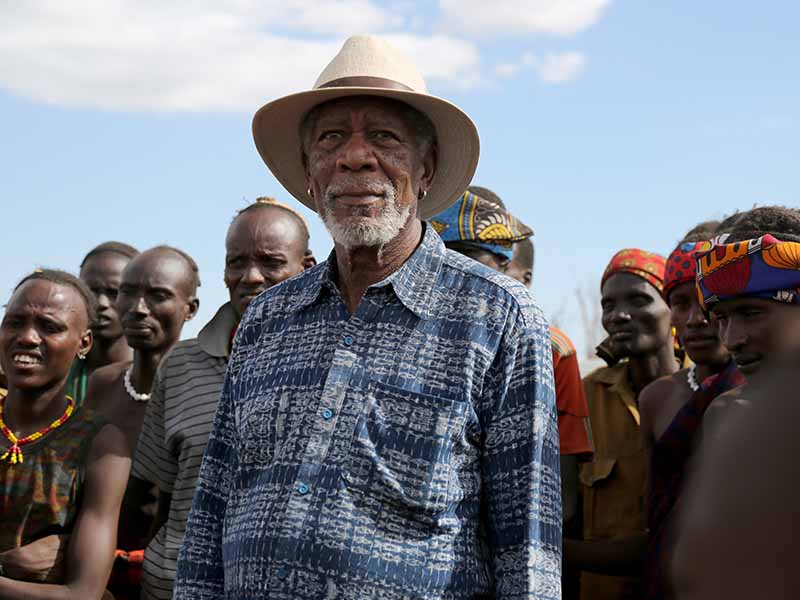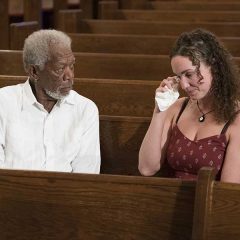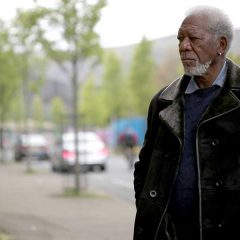(RNS) — Morgan Freeman wanted to understand how people who have lived through conflict can make peace.
So last May, the Academy Award-winning actor visited Rwanda’s Kigali Genocide Memorial, which commemorates the country’s brutal civil war between the Tutsi and Hutu ethnic groups.
Sitting across from him were a Tutsi woman who lost her family – and the Hutu man who had killed them during a genocide that left around 800,000 people dead.
And seated next to them was the bishop who had introduced the pair, as part of an ambitious reconciliation program.
Offering forgiveness was no easy task, the woman told Freeman. “But the Word of God was helping me to take the step and pardon the killers.”
Now, the two live as neighbors.
That scene, in the second episode of Freeman’s new National Geographic series, left a deep impression on his team.
“I mean, how does someone do that?” executive producer James Younger asked. “Seeing these conversations taught me the incredible power and resourcefulness of the human spirit.”
The six-part docuseries “The Story of Us” explores big-picture questions about life and the human condition. Each hourlong episode zooms in on one topic: freedom, peace, love, division, power and rebellion. The first episode aired Wednesday (Oct. 11) at 9 p.m. Eastern on the National Geographic Channel, with the others to follow weekly.
The show follows up on last year’s “The Story of God,” in which Freeman explored faith in 20 cities around the world. After that experience, he and the producers realized how well audiences were receiving their genre of explorational storytelling.
“People do get something out of learning about other cultures,” Freeman told RNS in an interview. “And how so many of the differences pointed out to us are just from someone else’s imagination.”
[ad number=“1”]
When he was in Rwanda, for example, he saw no discernible difference between the Hutus and the Tutsis. “Showing that common thread is going to help us all,” Freeman said.
For him and his producers, the take-home message in “The Story of God” was really the commonality in the world’s diverse communities.
Often, producing partner Lori McCreary told RNS, it was faith that motivated groups to unite. In the second episode, Freeman travels to Southern Ethiopia, where villagers who’d been in a long-standing land rivalry came together with a peace ceremony. “When we come together and we pray to God, of course he will give us peace,” one elder said while hugging his former enemy.
But just as “The Story of Us” shows faith as a motivator for unity, it has examples of the deep, often deadly, division it can spark. The same episode takes viewers to Northern Ireland, where Freeman met a Roman Catholic man and a Protestant woman who’d struck up a dangerous friendship despite the nation’s denominational tensions and segregation. (The woman, who’d been driven out of her home and onto the streets because of threats, was made unidentifiable.)
[ad number=“2”]
In an episode exploring the world’s increasing polarization, Freeman meets a granddaughter of Westboro Baptist Church’s founder. Megan Phelps-Roper was an outspoken member of what the Southern Poverty Law Center calls “arguably the most obnoxious and rabid hate group in America.” But she left in 2012 — thanks to educational dialogue with strangers she met on Twitter.
- Los Angeles – Host Morgan Freeman meets with Megan Phelps-Roper, former Westboro Baptist Church Social Media manager, who explains how she turned her back on the church and its rhetoric of hate. National Geographic/Justin Lubin
- Belfast, Ireland – Morgan Freeman stares deeply at the Peace Walls in Ireland that separate the Protestants from the Christians. National Geographic/Maria Bohe
“We wanted to really lean into (Freeman’s) ability to get to the core and soul of people, and have him pull out from them the truth,” McCreary said.
The series veers clear of heavy academia, instead focusing on compelling stories of life. “First, we thought we’d do the story of man,” Younger explains. “But we didn’t want to do the whole archaeology thing. We want to show culture in its whole flowering.”
The result is what the team describes as human culture, told in a series of vignettes.
The show offers an antidote to those tired of all the poisonous political and media climate. Freeman uses his charisma and nondivisiveness to present a noncombative message at a time when discussions of freedom and peace are fraught with tension, political and otherwise.
The subjects are often hard-hitting – homelessness, incarceration, war, genocide, murder – but come as a gentle reminder of what makes us human.
[ad number=“3”]
In an interview with RNS last year, Freeman said filming “The Story of God” didn’t change his own view of God.
So did “The Story of Us” change his view on us?
Not at all, Freeman says.
“It deepened my understanding, perhaps. But as for what my views are, I’m about as confused as you.”
One of the many lessons is that people, whether they’re in the Westboro Baptist Church or 1994 Rwanda, nearly always believe they’re acting for the good.
“When you believe something, it is the truth,” Freeman said. “If you encounter me and I don’t believe it, you have three choices: walk away, stay and try to convince me that your truth is the truth, or eliminate me because I represent a danger to that belief system.”
The question, he says, is how we learn to interact with people who don’t necessarily believe what we do. And he’s hoping “The Story of Us” can provide America with some insights at a critical time.








